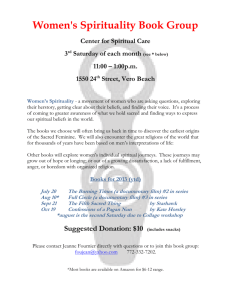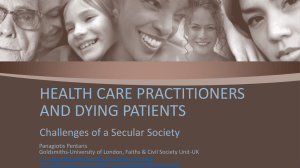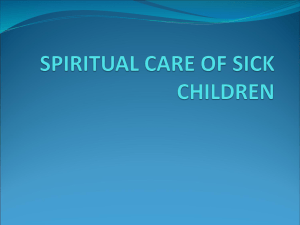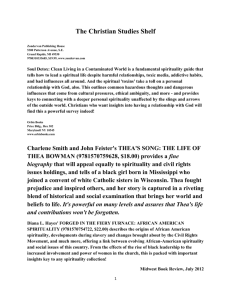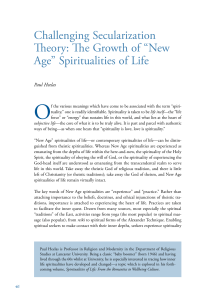Chris-Barber-Peter-K.. - University of Bradford
advertisement
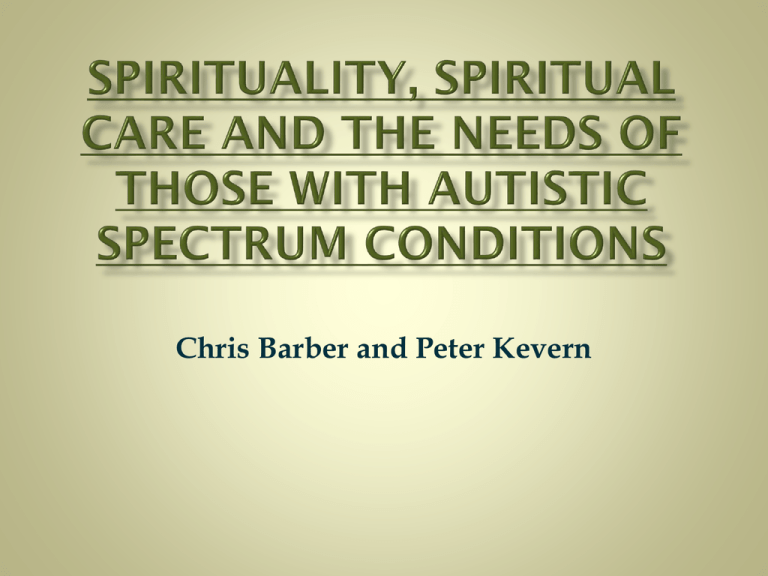
Chris Barber and Peter Kevern 80 70 60 Claiming to belong to a religion 50 40 Claiming awareness of "a spiritual dimension to their experience" 30 20 10 Sources: Hay (2002); British Social Attitudes Survey (2011) 0 1987 2000 2009 Defined in contrast to ‘religion’: ‘internal’ v. ‘external’ Individual v. corporate Experiential v. dogmatic Subjective-life v. life-as-religion (Heelas & Woodhead 2004) • • • The turn to ‘spirituality’ reflects late capitalist culture (Carrette & King) ‘Spirituality’ becomes Religion; religious structures remain by far the most important vehicle for (Pearson) The prevailing ‘spiritual landscape’ of affective experiences of love and ‘connectedness’ (Percy) may unintentionally exclude some vulnerable people By listening to marginalised voices we have the opportunity to develop a richer palette of resources for spiritual care “A middle-aged Catholic with High Functioning Autism/Aspergers Syndrome” “To connect is, arguably, one of the most fundamental of all human needs. One’s ability to connect spiritually with the Divine, with ourselves, with others and with the natural world helps to define who and what we are.” Devotion to the Infant Jesus Ritual Prayer Centring Prayer and Lectio People with ASC are unlikely to benefit from vague and generic ‘spirituality’ They may however gain significant support from established, routinized and sociallyembedded practices Providing spiritual care for people with ASC may therefore require engagement with the ritual and historical elements of faithcommunities There are implications here for diversity and disability policies Carrette, J. and King, R. (2004) Selling Spirituality: the silent takeover of religion London: Routledge Hay, D. (2002)The Spirituality Of Adults In Britain – Recent Research Scottish Journal of Healthcare Chaplaincy Vol. .5 No 1 2002 , 4-9 Hay D. & Heald G. (1987) ‘Religion is good for you’, New Society, 17 April. Hay D. & Hunt K. (2000) Understanding the Spirituality of People who don’t go to Church, Final Report of the Adult Spirituality Project, Nottingham University. Heelas, P and Woodhead, L. (2004) The Spiritual Revolution: why religion is giving way to spirituality Cambridge: Blackwell Pearson, J. (2003) ‘Witchcraft will not soon vanish from this earth’: Wicca in the 21st century in Davie, G., Heelas, P., & Woodhead, L. Eds, Predicting Religion: Christian, Secular and Alternative Futures Aldershot: Ashgate 170-182 Percy, M. (1998a) ‘Erotic ideology in experiential religion’ Power in the Church. Ecclesiology in an age of transition London: Continuum 141-162 Percy, M. (1998b) ‘Things Fall Apart II: experiential religion and the absence of theology’ Power in the Church. Ecclesiology in an age of transition London: Continuum 183-204 Schrock, K. (2010) People with Asperger's less likely to see purpose behind the events in their lives. Scientific American May 29, 2010 http://www.scientificamerican.com/blog/post.cfm?id=people-with-aspergers-less-likely-t2010-05-29




